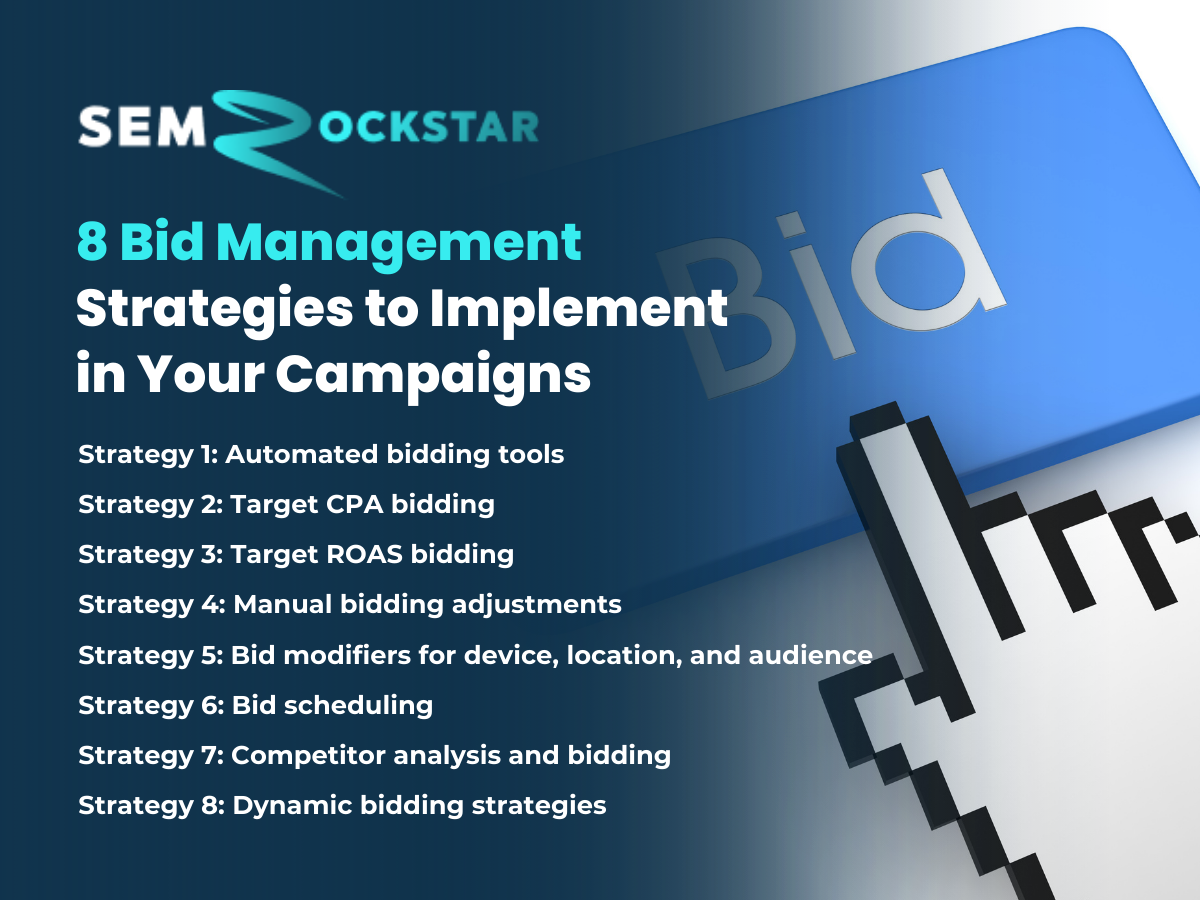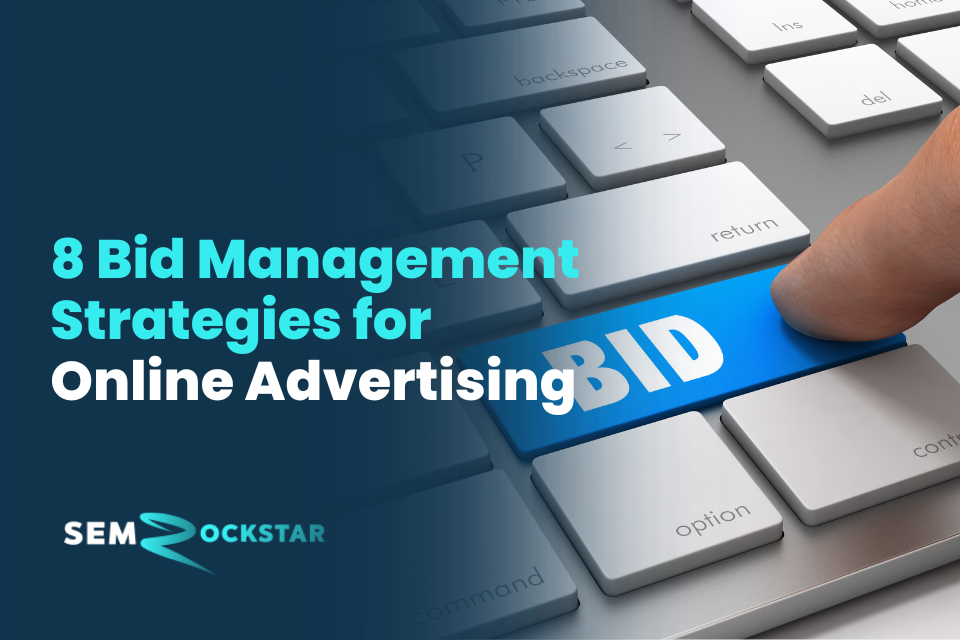In the dynamic landscape of online advertising, bid management stands as a cornerstone for success. It allows advertisers to optimize bids effectively and make all the difference between soaring campaign performance and sinking into obscurity.
However, harnessing the power of bid management strategies is not merely about adjusting numbers; it's about understanding audience behavior, market trends, and the intricacies of various platforms.
So, in this article, we delve into the top eight essential bid management strategies that can elevate your online advertising efforts to new heights.
What is Bid Management in online advertising?
Before diving right into the strategies, we must know what Bid Management is.
Basically, bid management is the process of managing bids, or the amount of money advertisers are willing to pay for each click, impression, or conversion in online advertising auctions. It involves monitoring, adjusting, and optimizing bids to achieve specific advertising objectives.
In platforms like Google Ads, Bing Ads, and Facebook Ads, advertisers bid for ad placements, and the platform determines ad placement based on factors such as bid amount, ad relevance, and ad quality. As such, bid management requires a deep understanding of advertising platforms, target audience behavior, and competitive landscape.
Why is Bid Management Important in Online Advertising?
As mentioned, bid management is essential to achieving advertising goals. It is critical in online advertising for the following reasons:
- Cost Efficiency. Effective bid management helps advertisers allocate their budgets efficiently, ensuring they get the most out of their advertising spend.
- Performance Optimization. Advertisers can improve the overall performance of their campaigns through bid management based on performance data and campaign objectives.
- Competitive Advantage. Advertisers can gain a competitive edge by strategically bidding for ad placements, especially in competitive markets where ad space is limited.
- Targeting Precision. Bid management allows advertisers to target specific audience segments more effectively by adjusting bids based on factors such as demographics, device type, and geographic location.
- Ad Ranking Improvement. Strategic bidding can improve ad ranking, leading to better visibility and higher click-through rates (CTRs).
Eight Bid Management Strategies to Implement

Strategy 1: Automated bidding tools
Say hello to automated bidding tools!
Platforms like Google Ads and Bing Ads offer. These tools use algorithms to adjust your bids in real time based on your ads' performance.on historical data, performance goals, and user behavior. They can optimize bids for various objectives, such as maximizing clicks, conversions, or return on ad spend (ROAS).
With these tools, advertisers can save time and optimize bids to achieve desired outcomes.
Strategy 2: Targeting CPA bidding
Next on our Bid Management Strategies is targeting Cost-Per-Acquisition (CPA) bidding. This strategy is your best friend if you're all about getting the most conversions for your buck.
Basically, the platform automatically adjusts bids to meet the specified CPA goal while maximizing conversions. This strategy is ideal for advertisers who drive conversions within a specific budget while maintaining profitability.
Strategy 3: Target ROAS bidding
Target Return on Ad Spend (ROAS) bidding suits advertisers looking to maximize revenue or profit from their advertising campaigns.
Advertisers set a target ROAS, and the platform adjusts bids to achieve that goal while maximizing revenue or profit. For example, you're selling trendy sneakers online. With Target ROAS bidding, you can set a specific goal, like aiming for $5 in revenue for every $1 you spend on ads.
Once you've set your ROAS target, the platform's smart algorithms kick in. They'll analyze tons of data – like past performance, user behavior, and even weather patterns sometimes – to figure out the best bid for each ad auction.
This strategy is particularly effective for e-commerce businesses aiming to generate a positive return on their ad spend.
Strategy 4: Manual bidding adjustments
Sure, automated bidding is cool, but sometimes you just want to take control yourself. That said, manual bidding is still one of the best bid management strategies.
Here's how it works: Let's say you're running ads for your coffee shop, and you notice you're getting more clicks and conversions during the morning rush hour. With manual bidding adjustment, you can roll up your sleeves and tweak your bids to capitalize on those peak times. Advertisers can manually adjust bids based on performance data, competitive landscape, and campaign objectives.
This strategy allows for greater flexibility and customization, especially in highly competitive or niche markets where automated bidding may not suffice.
Strategy 5: Bid modifiers for device, location, and audience.
Want to bid more for mobile users or folks in high-converting locations? You can use a bid modifier for this!
Bid modifiers allow advertisers to adjust bids based on factors such as device type, geographic location, and audience demographics. Advertisers can adjust bids to target specific segments more effectively by analyzing performance data and user behavior. For example, advertisers may increase bids for mobile users or users in high-converting locations to improve campaign performance.
Strategy 6: Bid scheduling
Another one of the best bid management strategies is bid scheduling. It involves adjusting bids based on the time of day, day of the week, or specific events such as holidays or promotions.
Imagine this: You're running ads for your fitness studio. You know that most people are more likely to search for gym memberships after work hours or on weekends. Then, this is when you should run your advertisement.
With bid scheduling, you can schedule your bids to increase during those peak times when potential customers are most active.
Strategy 7: Competitor analysis and bidding
Keeping an eye on what your competitors are up to can give you a leg up in the bidding game. Analyzing your competitor's campaign and big strategies can help advertisers gain a competitive advantage.
For starters, competitor analysis can help you identify gaps in the market. Maybe you notice that one of your competitors isn't targeting a specific geographic area or demographic group. With this intel, you can swoop in and capture that untapped audience by adjusting your bids accordingly.
But that's not all. Competitor analysis can also help you gauge the competitiveness of your industry. If you notice that your rivals are bidding aggressively for specific keywords or ad placements, it's a sign that those areas are hotly contested.
With these bid management strategies, you can adjust your bids strategically to maximize your chances of winning those coveted spots.
Strategy 8: Dynamic bidding strategies
Another one of the top bid management strategies is dynamic bidding. Basically, it adjusts bids dynamically to maximize conversions or conversion value while staying within the specified budget. Let's break it down:
- Enhanced CPC (eCPC). This strategy is all about letting the platform do the heavy lifting. With eCPC, the platform automatically adjusts your bids to maximize conversions based on historical data and user behavior.
- Maximize Conversions. As the name suggests, this strategy is about maximizing the conversions you get from your budget. The platform will adjust your bids dynamically to bring you the most conversions possible within your budget constraints.
And here's the deal: Dynamic bidding is particularly effective in competitive environments where conditions change rapidly. With this strategy, you can tailor your bids to suit the specific goals of each campaign.
Wrapping Up
Bid management might seem like a daunting task, but with the right strategies in your arsenal, you'll be bidding like a pro in no time. Whatever your goal is, mastering the above-mentioned bid management strategies is the key to unlocking the full potential of your online advertising campaigns.
So go forth, fellow marketer, and may your bids be ever in your favor! If you want to learn more tips from SEMRockstar, read our other articles!




